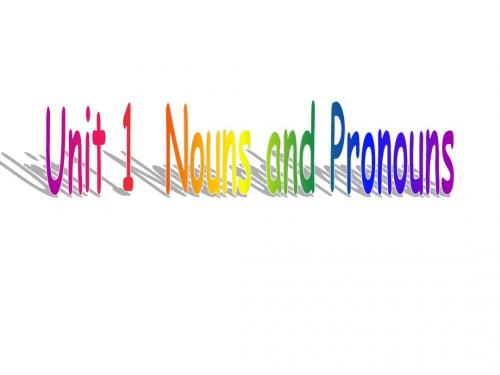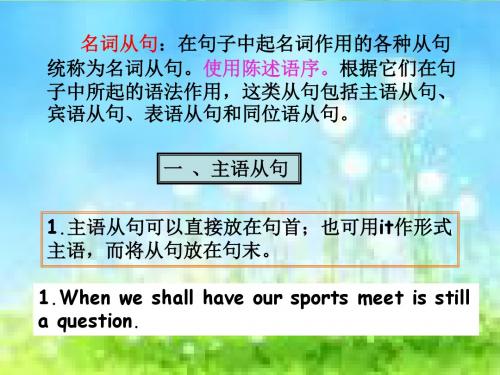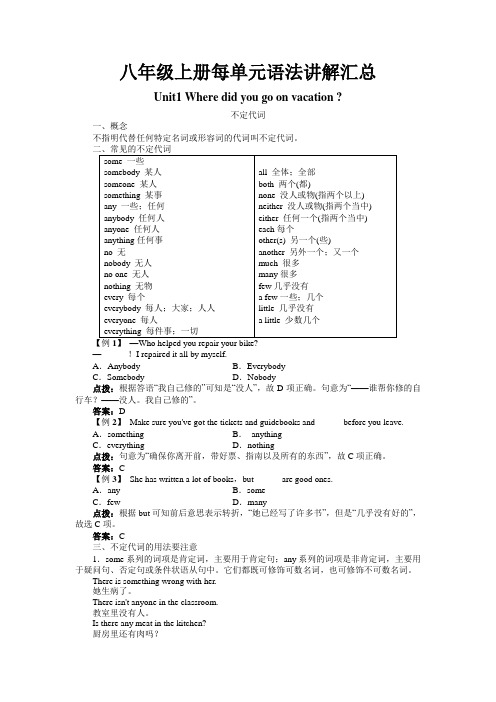语法学习--名词性分句(Unit1)
- 格式:doc
- 大小:35.50 KB
- 文档页数:2

感顿市安乐阳光实验学校第二中学英语选修8unit1《语法-名词性从句》教案【课标要求】1.掌握主从复合句中的宾语、主语、表语从句。
2.在语境中了解和掌握名词性从句的表意功能。
【预习案】1.名词:表示人或事物的名称的词叫名词。
2.名词在句子当中一般可以作什么成分The boy is li Ming.主语表语Mr. Liang , a 24-year-old boy, teaches us English .主语同位语宾语名词在句中主要作主语、宾语、表语和同位语。
名词性从句在功能上相当于名词语 His job is imp ortant.What he does is important.语 This is his job.This is what he does every day.语I don’t like his job.I don’t like what he does every day.语I don’t know about the man, Mr. White.I don’t know about the fact that he is a teacher.引导名词性从句词有:连接词作用whether 是否that (本身无词义) 只起连接词作用,引导从句,在从句中不作任何成分who, whom, whose which 哪一个what 什么,所…的在从句中作主语、宾语和定语在从句中作主语、宾语和定语在从句中作主语、宾语和定语when什么时候,where什么地方how怎样、怎么,why为什么除了起连接词作用外,还在从句中作状语不可省略的连词:1. 介词后的连词2. 引导主语从句和同位语从句的连词不可省略。
That she was chosen made us very happy.We heard the news that our team had won.名词性从句高考考查主要内容①引导词的选择与判断;②词序:不倒装(陈述语序);③时态:注意主,从句时态的呼应二次备课(教师)学习补充及疑惑(学生)判断以下句子是什么从句?1.Whoever comes is welcome.2.How we can help the twins will be discussed at the meeting.3. It has no t been decided yet when they’ll start the project.4. The question is who can complete the difficult task.5. The problem is how we can get there on time.6. I always think of how I can improve my spoken English.7. I wonder why she refused my invitation8. I suggest we (should) set off at once.9. The suggestion that the mayor (should) present the prizes was acceptedby everyone.【探究案】一、检查反馈,导入新课。



Unit 1:My name's Gina.嘿,大家好。
第一单元我们学习了部分人称代词主格和形容词性物主代词。
✍人称代词主格在句中作主语,是整个句子的龙头老大。
注意点:但值得注意的是:I 作主语时,be 动词用 am;she/he/it 作主语时,be 动词用 is。
英语人称代词用法口诀:人称代词主宾格,作用不同莫用错。
主格动词前做主,动词介词后宾格。
You和it主宾同,其他主宾须分清。
人称代词并列现,尊重他人礼当先。
单数人称二三一,复数人称一二三。
若把错误责任担,第一人称我靠前。
✍形容词性物主代词具有形容词的特性,常放在名词前面作定语,表明该名词所表示的人或物是"谁的"所以我不能单独使用,其后必须跟名词。
比如:my name; your friend……英语物主代词用法口诀:物主代词分两种,形容词性名词性。
形容词性能力差,自己不能来当家。
句子当中作定语,身后定把名词加。
物主代词名词性,相当名词可单用。
句中充当主宾表,身后没有名词影。
两种代词形不同,添个 s 形变名。
his,its不用变,my变mine要记清。
经典例句1人称代词主格1. I am a girl. 我是一个女孩。
2. He/She is my friend. 他/她是我的朋友。
3. You are very nice. 你非常好。
4. It is a bed. 它是一张床。
2形容词性物主代词5. My name is Mary. 我的名字叫玛丽。
6. Your room is so tidy. 你的房间很整洁。
7. This is his/her pen. 这是他/她的钢笔。
8. That is my dog. Its name is Susan.那是我的狗。
它的名字叫苏珊。
9.He's a student. His mother is a teacher. 他是一名学生。
他妈妈是一位教师。

八年级上册每单元语法讲解汇总Unit1 Where did you go on vacation ?不定代词一、概念不指明代替任何特定名词或形容词的代词叫不定代词。
—______!I repaired it all by myself.A.Anybody B.EverybodyC.Somebody D.Nobody点拨:根据答语“我自己修的”可知是“没人”,故D项正确。
句意为“——谁帮你修的自行车?——没人。
我自己修的”。
答案:D【例2】Make sure you've got the tickets and guidebooks and ______before you leave.A.something B.anythingC.everything D.nothing点拨:句意为“确保你离开前,带好票、指南以及所有的东西”,故C项正确。
答案:C【例3】She has written a lot of books,but______ are good ones.A.any B.someC.few D.many点拨:根据but可知前后意思表示转折,“她已经写了许多书”,但是“几乎没有好的”,故选C项。
答案:C三、不定代词的用法要注意1.some系列的词项是肯定词,主要用于肯定句;any系列的词项是非肯定词,主要用于疑问句、否定句或条件状语从句中。
它们都既可修饰可数名词,也可修饰不可数名词。
There is something wrong with her.她生病了。
There isn't anyone in the classroom.教室里没有人。
Is there any meat in the kitchen?厨房里还有肉吗?在Would you like sth.?之类的问句中用some,不用any。
2.由some,any,no,every构成的复合不定代词作主语时,谓语动词用第三人称单数形式。

Grammar 名词性从句(选修八Unit One )主语从句( That he is lying makes us sad. )表语从句( The true is that he had died. )名词性从句宾语从句( She told me that she was not excited. )同位语从句( The fact that he is poor is obvious. )熟读下列各句,划出从句部分并判断从句在全句中作什么成分。
1. What he did made me extremely angry.2. Her first question was whether Mr. Smith had arrived or not.3.The fact that he tells lies all the time makes us surprised.4. China is becoming stronger and stronger. It is no longer what it used to be.5. He told me that his father had died and that he lived alone.6. She has made it clear that she will get married next month.7. Make sure that there are no mistakes in your papers before you turn them in.8. Whether we will go picnicking tomorrow depends on the weather.9. The advice that she wait till next week is reasonable.10. He looks as if he were very angry.11. There is no doubt that he is not fit for the job.12. This depends on whether the weather is fine.㈠主语从句常用it作形式上的主语。
人教版八年级上册英语Unit1知识点语法归纳总结Unit 1 Where did you go on vacation?1. 短语归纳①go on vacation去度假②stay at home 呆在家③go to the mountains 上山/进山④go to the beach到海边去⑤visit museums 参观博物馆⑥go to summer camp 去夏令营⑦quite a few 相当多⑧study for为……学习⑨go out 出去⑩most of the time 大部分时间/绝大多数时间11 taste good 尝起来味道好12 have a good time玩的开心13 of course当然可以14 feel like感觉像……/想要15 go shopping购物16 in the past 在过去17 walk around绕……走18 too many 太多(可数名词前面)19 because of 因为20 one bowl of 一碗……21 find out 查出来/发现22 go on继续23 take photos 照相24 something important重要的事情25 up and down上上下下26 come up出来2. 典句必背①—Where did you go on vacation? 你到哪里去度假了?—I went to New York City. 我去了纽约城②—Did you go out with anyone? 你出去带人吗?—No, No one was here. Everyone was on vacation. 不,没有人在这儿。
大家度去度假了。
③—Did you buy anything special? 你买了什么特别的东西吗?—Yes, I bought something for my father. 对,我给父亲买了一些东西。
八上英语unit1语法归纳摘要:I.引言- 介绍八上英语unit1 的语法内容II.名词的数- 单数和复数形式- 名词所有格的构成III.代词的用法- 人称代词的用法- 物主代词的用法- 指示代词的用法IV.冠词的用法- 定冠词"the"的用法- 不定冠词"a"和"an"的用法V.形容词的比较级和最高级- 形容词比较级的构成- 形容词最高级的构成VI.副词的比较级和最高级- 副词比较级的构成- 副词最高级的构成VII.祈使句和感叹句- 祈使句的构成- 感叹句的构成VIII.疑问句的构成- 一般疑问句的构成- 特殊疑问句的构成IX.反义疑问句的构成- 反义疑问句的构成规则X.总结- 复习本单元的语法重点正文:在八上英语unit1 中,我们学习了一系列重要的语法知识,包括名词的数、代词的用法、冠词的用法、形容词和副词的比较级和最高级、祈使句和感叹句以及疑问句的构成。
下面我们将对这些知识点进行详细的讲解和归纳。
首先,我们学习了名词的数。
名词分为可数名词和不可数名词。
可数名词有单数和复数两种形式,复数形式通常在名词后加"s"或"es"。
此外,我们还学习了名词所有格的构成,例如,表示"我的"、"你的"等意思时,名词所有格用""s"表示。
接下来,我们探讨了代词的用法。
代词分为人称代词、物主代词和指示代词。
人称代词有"I"、"you"、"he"、"she"、"it"、"we"、"they",用于替代名词,表示句子的主语或宾语。
物主代词有"my"、"your"、"his"、"her"、"its"、"our"、"their",表示名词的归属。
第一单元基础语法语法是语言的基础,是用来组织和表达思想的工具。
在学习语言的过程中,掌握基础语法知识是非常重要的。
本文将介绍第一单元的基础语法内容,包括主语和谓语、单数和复数、动词时态、名词的所有格和代词的人称。
一、主语和谓语主语是句子中起名词或代词作用的部分,而谓语则是表达主语行为、状态或属性的动词。
在句子中,主语和谓语通常是不能缺少的。
例如:1. 主语和谓语都是名词:My sister sings beautifully.2. 主语是名词,谓语是动词:They play basketball every Sunday.3. 主语是代词,谓语是动词:She reads a book.二、单数和复数英语中,名词可以是单数形式,也可以是复数形式。
通常情况下,加“-s”或者“-es”可以将名词变为复数。
例如:1. 单数名词:dog, book, apple2. 复数名词:dogs, books, apples需要注意的是,在一些特殊情况下,名词的变化规则可能不同,例如:man-men, child-children。
三、动词时态动词时态表达的是动作或状态发生的时间。
在英语中,常用的时态有过去时、现在时和将来时。
例如:1. 过去时:They went to the park yesterday.2. 现在时:I am reading a book now.3. 将来时:We will visit the museum tomorrow.四、名词的所有格名词的所有格表示名词所属关系或者所具有的特征。
通常在名词后加上“'s”来构成所有格。
例如:1. 单数名词的所有格:Tom's book2. 复数名词的所有格:The students' bags五、代词的人称代词用来替代名词,以避免重复使用。
在英语中,代词包括人称代词和物主代词。
人称代词根据在句子中充当主语、宾语或者宾格而有不同的形式。
名词性分句
在复杂句中担任主语、主语补语、或宾语功能的限定性分句叫名词性分句。
因此,名词性分句可以分为主语分句,主语补语分句和宾语分句。
他们通常由从属连词(that, whether, it)连接代词(who, what, which)或连接副词(when, where, how, why)
Ⅰ.名词性分句的位置
1.主语分句处在复杂句中的主语位置:
That they will complete the project ahead of time seems unlikely.
That the earth is round is a fact.
Whether she likes the present is not clear to me.
What he says is true.
Where he is living is not known to us.
在有主语分句的复杂句中,可用先行词it作形式主语,把主语分句置后。
其中,that 引导的主语分句通常用先先行词it, 其他连接词引导的主语分句也可以用it.。
例如:It seems unlikely that they will complete the project ahead of time.
It is a fact that the earth is round.
It is not clear to me whether she likes the present.
It is not known to us where she is living
主补分句处在连系动词(通常是be)之后:
The first thought was who sent this flower.
The point is whether we should learn a foreign language.
This is where we once lived.
宾语分句有两个位置,
1) 在及物动词之后:
The doctor said (that) we should take no drugs of any kind without first talking to him.
Maria wondered if/whether cleaning the house was considered exercise.
He didn’t know whose book that was’
2)在介词之后:
It all depends on whether they will support us.
They are talking about what they should do next.
Ⅱ.名词性分句的意义
1. “陈述”意义,由that引导:
I t is possible that they can’t afford to buy the apartment. 他们可能买不起房子。
I know that he has gone abroad. 我知道他已经出国了。
2. “一般疑问”意义,或“是否…..”意义,由“whether/if”引导:
I wondered whether/if you’ve got the letter for me.
3. 特殊疑问意义,由“wh-“词引导(whether除外):
They haven’t decided who should be sent abroad.
4. 确定意义,由wh-词引导(whether除外).。
例如:
I’ll tell her what happened. 我要把发生的事情告诉他。
You can take which you like. 你可以拿你喜欢的那一个。
I’m who you are looking for. 我就是你要的那个人。
5. 感叹意义,由what和how引导:
It is unbelievable how fast she can run. 她会跑这么快,真叫人难以相信。
Do you still remember what a good time we had in the country? 你还记得我们在乡下过的是多么愉快吗?
Ⅲ.有关连接词的几点说明
1.that 在分句中不但任何成分,也无意义。
引导宾语分句时可省略。
但引导主语和主补分句时不可省略,尤其是主语分句置句首是一定不能省略。
2.whether和if在分句中也不担任任何成分,但他们都有词义“是否”。
whether能用于所有的名词性分句,if只能用于及物动词后的宾语从句,而不能用于主补分句,介词后的宾语分句及置句首的主语分句。
主语分句置后时,有时可以用if。
例如:
It’s not clear to me whether/if she likes the present.
3.wh-词本身都有词义(见Ⅱ中所述),都在分句中担任成分,连接代词在分句中担任主语,宾语,补语,连接副词在句中担任状语。
例如:
Who will be in charge has not been decided yet. (主语)
Which of the two TV sets they like is unknown to us. (宾语)
I don’t know who she is. ( 主补)
4.Wh-词引导的名词性分句的词序通常不用于疑问句。
其词序为“连接代词/连接副词+主语+动词(+....)”。
但当连接代词在分句中作主语时,其词序为“连接代词+动词(+……)”。
I don’t know who she is.
Who is she? 词序不同
Who will be in charge has not been decided yet.
Who will be in charge? 词序相同
5.谓语动词think, believe, expect, suppose 等后的that宾语分句中如果有否定意义,往往把否定词移至主句。
I don’t think that you will soon be back.
I don’t believe he has stolen th e watch.
注意这种结构的附加疑问句:
I don’t think that you will soon be back, will you?
I don’t believe he has stolen the watch, has he?
Ⅳ. 先行词it与宾语分句
1.先行词it 与宾语分句
当宾语分句(通常that宾语分句)有一宾语补语时,常用先行词it作形式宾语,把宾语分句置后,例如:
I think it important that we study English well.
Tom made it clear that he did not agree.
2.形容词与宾语分句
某些形容词后的“that-”和“wh-”分句可以称为宾语分句.
He was sure that she would not satisfy her sister.
I’m glad that you are looking well.
Are you sure how much the TV set costs?。